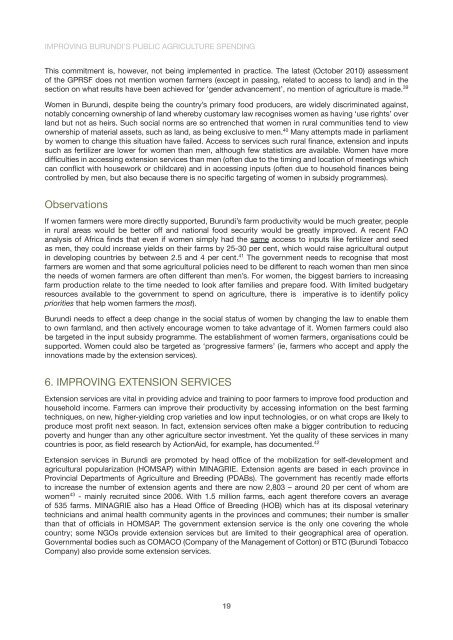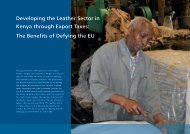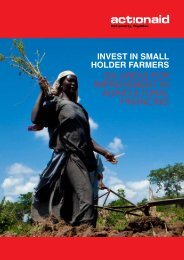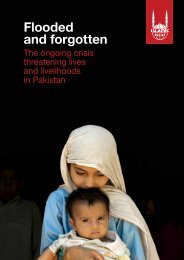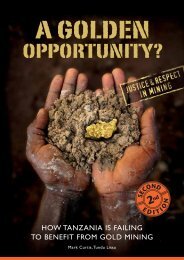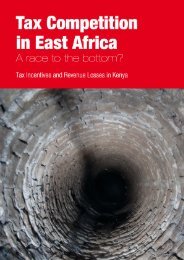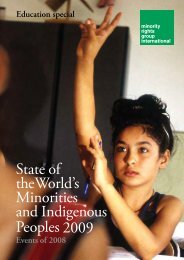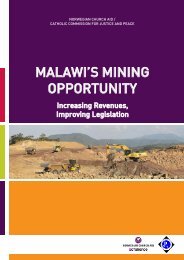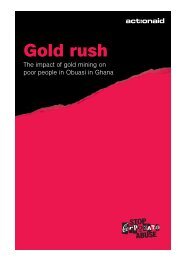IMPROVING AFRICAN AGRICULTURE SPENDING ... - Africa Adapt
IMPROVING AFRICAN AGRICULTURE SPENDING ... - Africa Adapt
IMPROVING AFRICAN AGRICULTURE SPENDING ... - Africa Adapt
You also want an ePaper? Increase the reach of your titles
YUMPU automatically turns print PDFs into web optimized ePapers that Google loves.
<strong>IMPROVING</strong> BURUNDI’S PUBLIC <strong>AGRICULTURE</strong> <strong>SPENDING</strong><br />
This commitment is, however, not being implemented in practice. The latest (October 2010) assessment<br />
of the GPRSF does not mention women farmers (except in passing, related to access to land) and in the<br />
section on what results have been achieved for ‘gender advancement’, no mention of agriculture is made. 39<br />
Women in Burundi, despite being the country’s primary food producers, are widely discriminated against,<br />
notably concerning ownership of land whereby customary law recognises women as having ‘use rights’ over<br />
land but not as heirs. Such social norms are so entrenched that women in rural communities tend to view<br />
ownership of material assets, such as land, as being exclusive to men. 40 Many attempts made in parliament<br />
by women to change this situation have failed. Access to services such rural finance, extension and inputs<br />
such as fertilizer are lower for women than men, although few statistics are available. Women have more<br />
difficulties in accessing extension services than men (often due to the timing and location of meetings which<br />
can conflict with housework or childcare) and in accessing inputs (often due to household finances being<br />
controlled by men, but also because there is no specific targeting of women in subsidy programmes).<br />
Observations<br />
If women farmers were more directly supported, Burundi’s farm productivity would be much greater, people<br />
in rural areas would be better off and national food security would be greatly improved. A recent FAO<br />
analysis of <strong>Africa</strong> finds that even if women simply had the same access to inputs like fertilizer and seed<br />
as men, they could increase yields on their farms by 25-30 per cent, which would raise agricultural output<br />
in developing countries by between 2.5 and 4 per cent. 41 The government needs to recognise that most<br />
farmers are women and that some agricultural policies need to be different to reach women than men since<br />
the needs of women farmers are often different than men’s. For women, the biggest barriers to increasing<br />
farm production relate to the time needed to look after families and prepare food. With limited budgetary<br />
resources available to the government to spend on agriculture, there is imperative is to identify policy<br />
priorities that help women farmers the most).<br />
Burundi needs to effect a deep change in the social status of women by changing the law to enable them<br />
to own farmland, and then actively encourage women to take advantage of it. Women farmers could also<br />
be targeted in the input subsidy programme. The establishment of women farmers, organisations could be<br />
supported. Women could also be targeted as ‘progressive farmers’ (ie, farmers who accept and apply the<br />
innovations made by the extension services).<br />
6. <strong>IMPROVING</strong> EXTENSION SERVICES<br />
Extension services are vital in providing advice and training to poor farmers to improve food production and<br />
household income. Farmers can improve their productivity by accessing information on the best farming<br />
techniques, on new, higher-yielding crop varieties and low input technologies, or on what crops are likely to<br />
produce most profit next season. In fact, extension services often make a bigger contribution to reducing<br />
poverty and hunger than any other agriculture sector investment. Yet the quality of these services in many<br />
countries is poor, as field research by ActionAid, for example, has documented. 42<br />
Extension services in Burundi are promoted by head office of the mobilization for self-development and<br />
agricultural popularization (HOMSAP) within MINAGRIE. Extension agents are based in each province in<br />
Provincial Departments of Agriculture and Breeding (PDABs). The government has recently made efforts<br />
to increase the number of extension agents and there are now 2,803 – around 20 per cent of whom are<br />
women 43 - mainly recruited since 2006. With 1.5 million farms, each agent therefore covers an average<br />
of 535 farms. MINAGRIE also has a Head Office of Breeding (HOB) which has at its disposal veterinary<br />
technicians and animal health community agents in the provinces and communes; their number is smaller<br />
than that of officials in HOMSAP. The government extension service is the only one covering the whole<br />
country; some NGOs provide extension services but are limited to their geographical area of operation.<br />
Governmental bodies such as COMACO (Company of the Management of Cotton) or BTC (Burundi Tobacco<br />
Company) also provide some extension services.<br />
19


